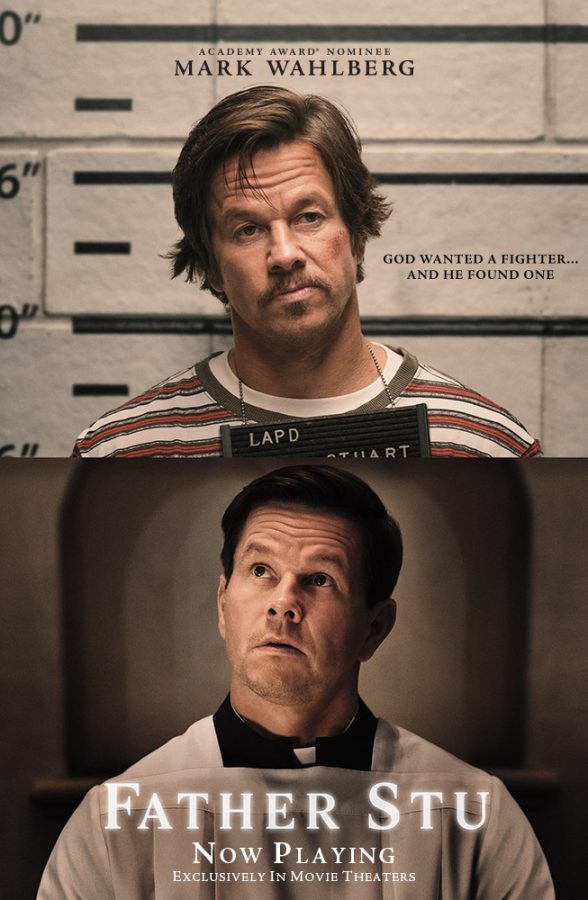Movie review: ‘Father Stu;’ A story of suffering and faith based on a true story
September 20, 2022
What’s new to watch on Netflix these days? On my recommendation list, I discovered “Father Stu,” which is a two-hour movie directed by Rosalind Ross that came out in 2022. Because Mark Wahlberg was in the image portrayed, I figured that it would be a good movie. So without reading the description, I clicked play.
Just a heads up, this movie does involve religion. In no shape or form am I recommending any specific religion. I just found the movie to be inspiring and emotional.
The movie starts with Stu, played by Wahlberg, singing a song for his father, Bill, played by Mel Gibson. Bill mentions that the only thing he has in common with his son is that they both like eating peanut butter. He tells Stu that he should eat his vegetables.
Fast forward to the future, we spot Stu, now an adult, going into the boxing ring. This is where the audience becomes aware that this movie was based on a true story.
After some time, Stu had a mishap and was sent to the hospital. At the scene, Stu’s mother Kathleen, played by Jacki Weaver, says she is disappointed in Stu’s career as she only has one child left to bet on after Stu’s brother, Han, died. She didn’t find his job appropriate, especially for his age and wellbeing.
When the doctor comes in, the audience is informed that Stu has a serious infection in his jaw bone, as well as extremely high inflammation markers in his blood. He adds that further testing is needed to see what is causing the problem, as it could be life-threatening; however, Stu believes that this was set up by his mom so that he can drop out of boxing.
He was disappointed that he couldn’t continue his dream job in boxing and was angry because he didn’t know what to do, and he want to obtain a blue-collar job. He became more upset and started drinking in front of his brother’s gravestone.
Later, Stu comes up with the idea of becoming a Hollywood actor, as he was “made to be on stage.” While pursuing his next dream, he packed and moved to a new location and in the meantime worked at a supermarket.
While working, he spotted a hispanic lady, Carmen, played by Teresa Ruiz. Stu started courting her. His boss even commented that his actions gave off a stalker-like vibe and that it could lead to an offense.
Through a co-worker, Stu finds out that Carmen attends a Catholic church. Because he was pursuing her, he shows up and over time changes his ways.
Unfortunately, Stu had a motorcycle accident while under the influence of alcohol. He didn’t know what to do. He had the mindset that he wasn’t worthy of living, and that his life should have been over and given to his brother instead.
“I think God saw something in you worth saving,” Stu’s brother Han, played by Aaron Moten, said. “But it’s up to you to decide what you’ve got to offer.”
After thinking it over a while, Stu comes up with the idea of becoming a priest. However, when his father found out, Bill said, “This is like Hitler asking to join the ADL,” because previously Stu was an atheist and the idea was silly. Bill continues taking a hand-gun out and handing it to Stu before mentioning that if he was going to disgrace him and his brother like that, he might as well bury him too.
Stuck in the mindset, he asks his parents to leave his place and actually goes in for training to become a priest.
Suddenly his leg gives out, and upon going to the hospital again, he finds out that he has a progressive muscle disorder. The disorder is called Inclusion Body Myositis. It’s rare and the symptoms are like ALS, where the muscles continue to weaken until they cease to function. So eventually, he would need assistance completing simple daily activities.
“It’s a profound experience, suffering. And the struggles of this disease … help me, and help others, to learn the way that we should have been living all along,” Stu said at the end of the movie. “It’s taught me a little humility. It’s taught me dignity and respect for others. And sometimes people like me, there’s an extreme example. We need things like this to be able to make those changes and decisions in our life that are gonna help us become better people.”
Note:
If you or someone else is showing signs of destructive behavior such as violence, suicidal thoughts or are experiencing distress, then it may be appropriate to look for support.
Call the National Suicide Prevention lifeline: 988
Text Go to 741741 to reach a trained Crisis Counselor through Crisis Text Line, a global nonprofit organization. It’s free and confidential to call 24/7.
https://www.sdstate.edu/red-folder/recognizing-students-distress-warning-sign
https://www.sdstate.edu/safety-security/warning-signs





















Meyer Odette • Aug 7, 2024 at 7:55 pm
Last year, my 68-year-old partner was diagnosed with Lou Gehrig’s disease also known as ALS. Speaking and swallowing were two of his challenges. His collapse was swift and catastrophic, and neither the riluzole nor the medical staff did much to aid him. He would not have survived if our primary care physician hadn’t given him attentive care and attention, as the hospital center didn’t provide any psychological support. His fall was abrupt and catastrophic. His hands and legs gave way to weakness in his arms. This year our family physician suggested using vinehealthcentre. com ALS/MND treatment, which my husband has been receiving for a few months now. I’m delighted to say that the treatment greatly reduced and reversed his symptoms of ALS, he no longer requires a feeding tube, sleeps soundly, works out frequently, and is now very active. In the hopes that it could be useful, I thought I would relate my husband’s tale; in the end, you have to do what suits you the best.
Meyer Odette • Jul 22, 2024 at 9:38 am
My husband had ALS/MND programme about 4 months ago. he no longer requires a feeding tube, sleeps soundly, works out frequently, and is now very active. It doesn’t make the ALS go away but it did give him better quality of life. we got the treatment from vinehealthcentre. com